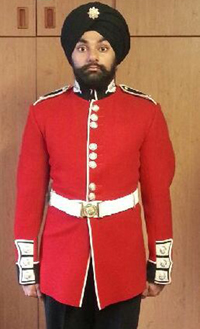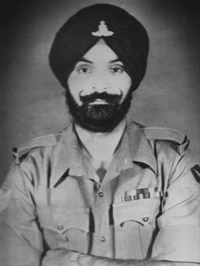Birmingham Dec 07 2012: The family of a Birmingham soldier at the centre of a row over his turban have hit back - pointing to the 80,000 Sikhs who died for Britain in the two world wars.
 Jatinderpal Singh Bhullar's relatives said they could not understand why the Army's decision to allow the 25-year-old to wear the headdress instead of a bearskin outside Buckingham Palace had caused such disquiet.
Jatinderpal Singh Bhullar's relatives said they could not understand why the Army's decision to allow the 25-year-old to wear the headdress instead of a bearskin outside Buckingham Palace had caused such disquiet.
They spoke after former members of the Scots Guards complained the spectacle would look "ridiculous" and make a mockery of the regiment's 180-year tradition of wearing bearskins on ceremonial duties.
Serving soldiers, who are barred from speaking publicly on such issues, were also reported to have reservations about Bhullar's exemption.
And it was claimed he had suffered taunts from fellow servicemen about his turban and his refusal to cut his hair and beard.
But Bhullar's uncle, Gurpartap Singh Bhullar, said he was confident the furore would die down once the soldier had gone on parade.
Gurpartap, aged 57, said his nephew was the third generation of his family to join the Army and highlighted the huge sacrifice made by Sikh soldiers in both the First and Second World Wars, with more than 80,000 killed in the conflicts.
"We are proud he has put his foot down and said that religion comes first," he said.
"Sikhs are Army-orientated and that goes for our family too. My grandfather fought in the First World War and my father was a gunner in the Second World War.
"Thousands of Sikhs have fought and died for the UK. They never gave up their turbans so why can't a Sikh soldier guard the Queen while wearing his?
"A Sikh must always wear his turban. We have to keep it - there are no ifs and buts."
Slough-based Gurpartap said Bhullar, who lives with his wife near Birmingham city centre, gave up a potentially lucrative career as a bricklayer to join the Army.
His company is currently responsible for public duties and guarding the Queen and he is expected to parade outside Buckingham Palace in the next week.
When he does so, Bhullar - who is among a handful of Sikh soldiers in the Army - will become the first member of the Scots Guards not to wear a bearskin in a ceremonial capacity since they were introduced.
He has the backing of the Ministry of Defence, with a spokesman saying the Army took "great pride in its diversity".
Bhullar's chaplain reportedly claimed he had suffered "ignorance and verbals" from colleagues but the soldier did not say he had been bullied.
Mandeep Kaur said: "He had problems telling why he has to wear the turban and why it means so much to him.
"It was ignorance and verbals but he did not call it bullying.
'He was determined to come through everything to explain his religion, the significance of the turban and why it is more important to him than a bearskin."
Jatinderpal Singh Bhullar's grandfather Kirpal Singh Bhullar
 But the Army's decision to grant Bhullar a bearskin exemption was attacked by members of the Scots Guards' regimental association who, unlike serving soldiers, are allowed to speak publicly on such issues.
But the Army's decision to grant Bhullar a bearskin exemption was attacked by members of the Scots Guards' regimental association who, unlike serving soldiers, are allowed to speak publicly on such issues.
David Cuthill, chairman of the Dundee branch, said: "It should be regiment first and religion second. A guardsman is not a guardsman if he's not wearing his bearskin. Hundreds of years of tradition should be protected. I appreciate his predicament, but if all the other guardsmen are in bearskins and he is in a turban, it is going to look ridiculous."
The requirements to wear a turban and keep hair uncut have been key articles of the Sikh faith since the 17th century.
But Sikhs have often experienced problems combining their duty to their religion with the demands of their careers.
Two years ago, Sikh police officers demanded a review of health and safety rules after being told they could not join cycle patrols because the helmets would not fit over their turbans.
The British Sikh Police Association called for the guidelines to be changed to accommodate Britain's 2,000 Sikh officers.
The Association of Chief Police Officers (ACPO) said the decision was down to individual forces.
In the same year, it was also reported that Sikh officers would be banned from joining police firearms or riot teams unless they removed their turbans. ACPO said Sikh officers in those units would have to adopt a patka - a smaller piece of material - so they could wear bullet proof helmets.
Turbans were deemed unsafe because they did not fit under helmets and were said to offer insufficient protection alone.
In 2009, a Sikh police officer who was ordered to remove his turban during riot training was awarded s10,000 compensation by an employment tribunal for discrimination. But Sikhs do not have to wear crash helmets under the Motorcycle Crash Helmets Act 1976.
